【06】Spring源码-分析篇-ApplicationContext

Spring源码篇-ApplicationContext
前面通过手写IoC,DI、AOP和Bean的配置。到最后ApplicationContext的门面处理,对于Spring相关的核心概念应该会比较清楚了。接下来我们就看看在Spring源码中,对于的核心组件是如何实现的。
一、ApplicationContext
ApplicationContext到底是什么?字面含义是应用的上下文。这块我们需要看看ApplicationContext的具体的结构。

通过ApplicationContext实现的相关接口来分析,ApplicationContext接口在具备BeanFactory的功能的基础上还扩展了 应用事件发布,资源加载,环境参数和 国际化的能力。然后我们来看看ApplicationContext接口的实现类的情况。
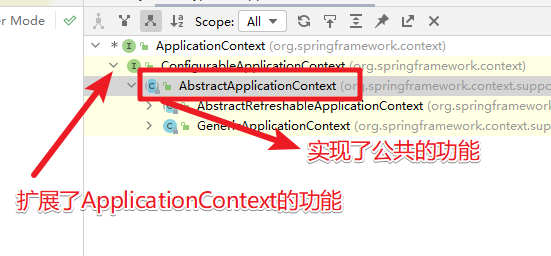
在ApplicationContext的实现类中有两个比较重要的分支 AbstractRefreshableApplicationContext和 GenericApplicationContext.
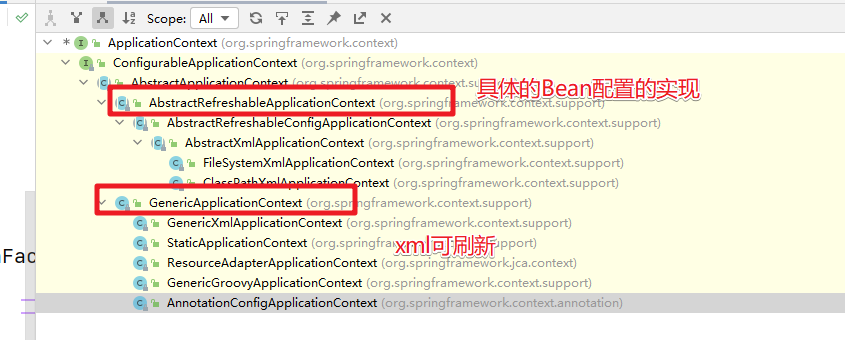
二、BeanFactory
上面分析了 ApplicationContext接口的结构。然后我们来看看 BeanFactory在ApplicationContext中具体的实现是怎么样的
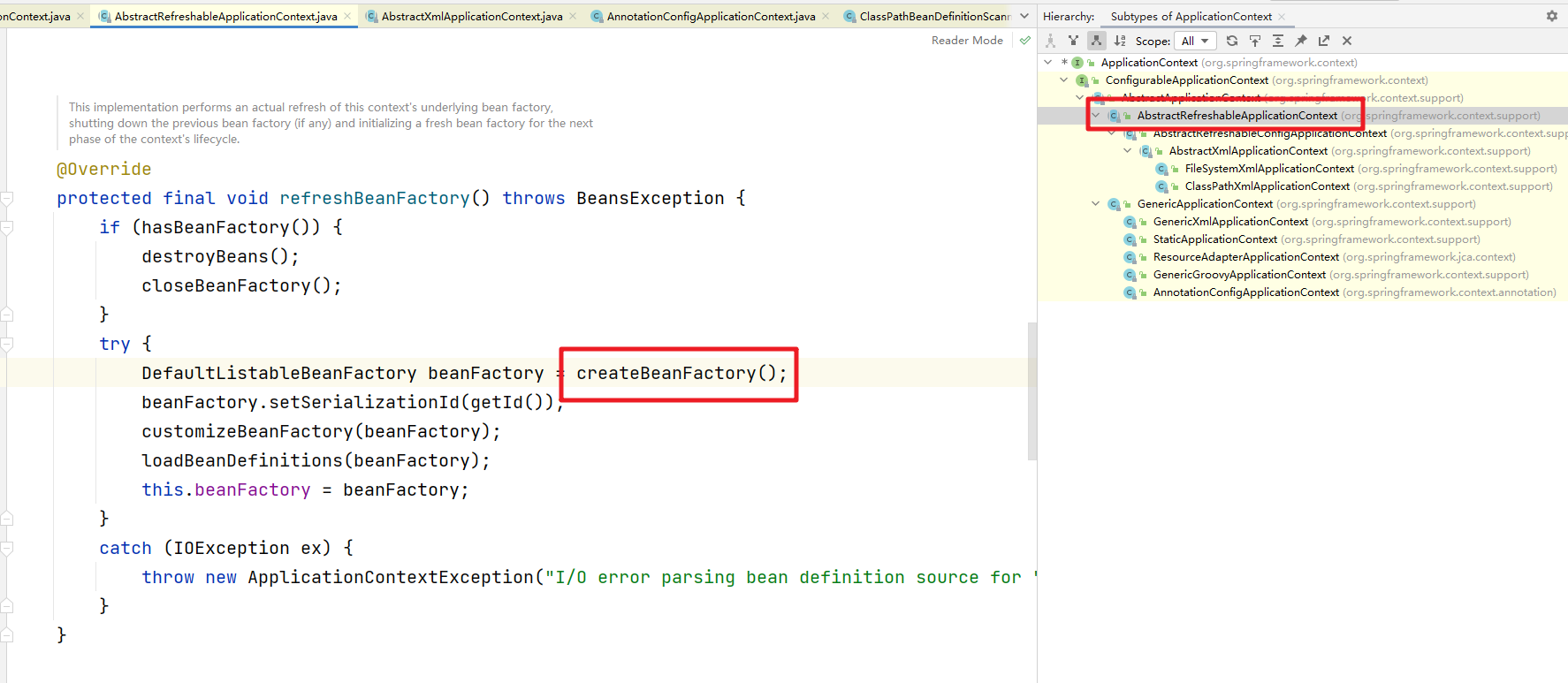

可以看到具体的实现是 DefaultListableBeanFactory .然后我们来看看他的体系结构
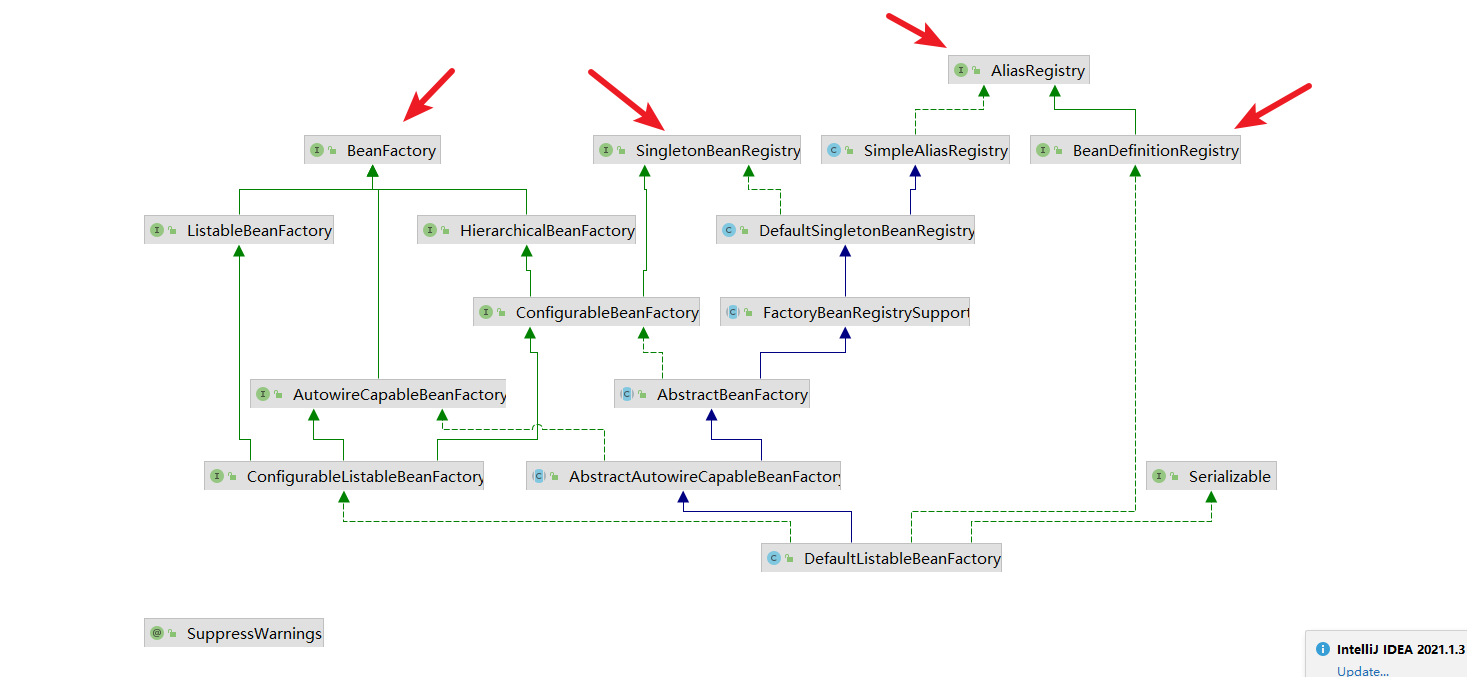
BeanFactory的继承体系
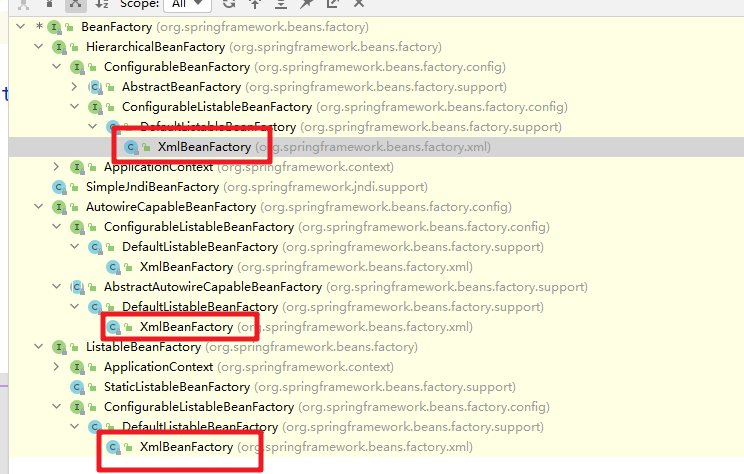
三、BeanDefinition
然后我们来了解下ApplicationContext是如何来加载Bean定义的。具体代码我们需要分为XML配置文件和基于注解的两种方式来看。
1.基于XML方式
我们先定义对应的application.xml文件
<?xml version="1.0" encoding="UTF-8"?>
<beans xmlns="http://www.springframework.org/schema/beans"
xmlns:xsi="http://www.w3.org/2001/XMLSchema-instance"
xmlns:context="http://www.springframework.org/schema/context"
xmlns:aop="http://www.springframework.org/schema/aop"
xsi:schemaLocation="http://www.springframework.org/schema/beans
http://www.springframework.org/schema/beans/spring-beans.xsd
http://www.springframework.org/schema/context
http://www.springframework.org/schema/context/spring-context.xsd
http://www.springframework.org/schema/aop
http://www.springframework.org/schema/aop/spring-aop.xsd">
<bean id="beanE" class="com.study.spring.sample.config.BeanE" />
<bean id="beanF" class="com.study.spring.sample.config.BeanF" ></bean>
<context:annotation-config/>
<context:component-scan base-package="com.study.spring.sample.config" ></context:component-scan>
</beans>
- 1
- 2
- 3
- 4
- 5
- 6
- 7
- 8
- 9
- 10
- 11
- 12
- 13
- 14
- 15
- 16
- 17
- 18
- 19
- 20
- 21
然后我们的测试类代码
public class XMLConfigMain {
public static void main(String[] args) {
ApplicationContext context = new GenericXmlApplicationContext(
"classpath:com/study/spring/sample/config/application.xml");
BeanF bf = context.getBean(BeanF.class);
bf.do1();
}
}
- 1
- 2
- 3
- 4
- 5
- 6
- 7
- 8
- 9
处理的过程 解析XML --> BeanDefinition --> BeanDefinitionRegistry --> BeanFactory
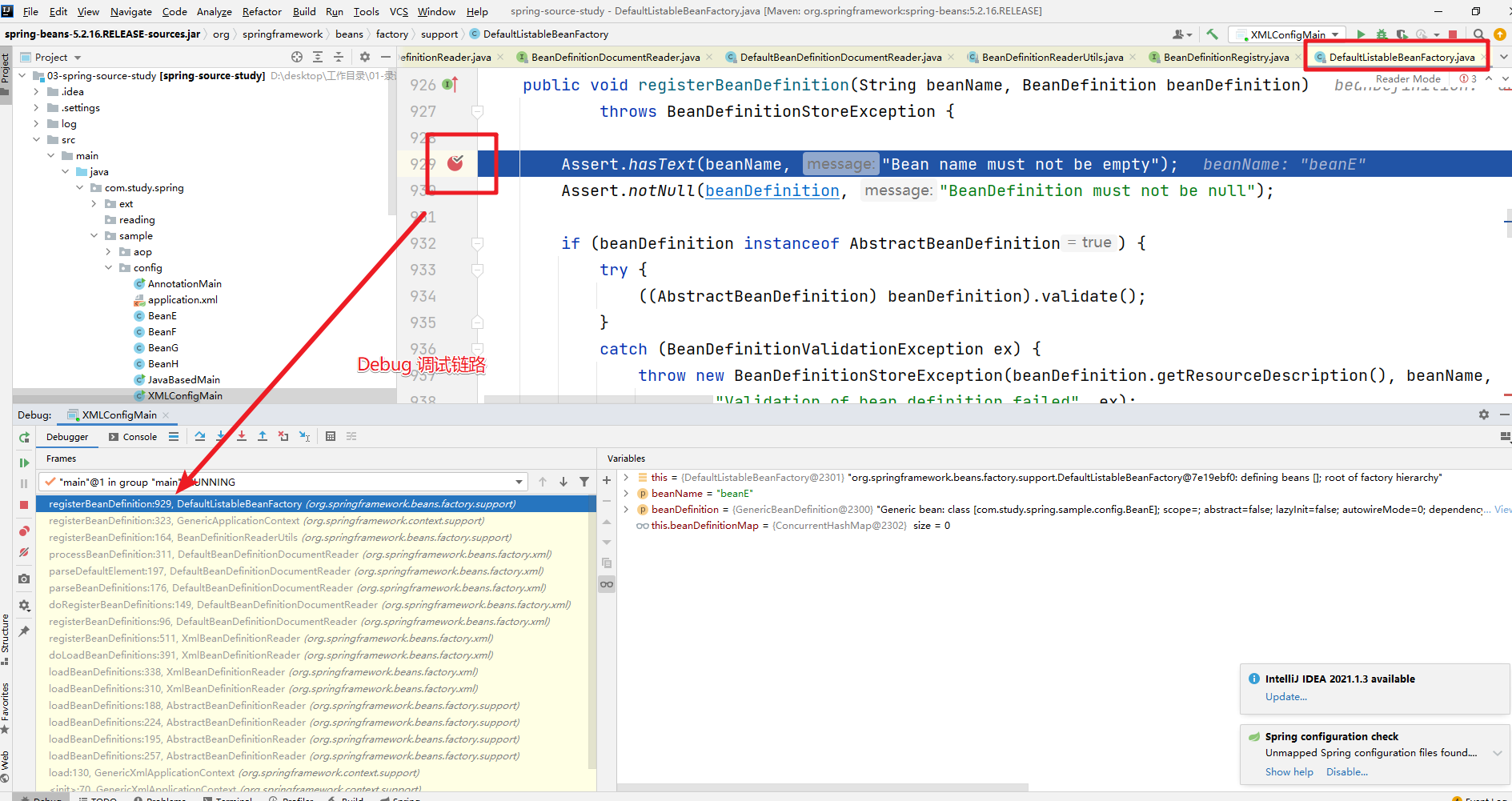
2.基于注解方式
然后来看看基于注解方式的使用的情况。首先是我们的配置类
@Configuration
@ComponentScan("com.study.spring.sample.config")
public class JavaBasedMain {
@Bean
public BeanH getBeanH() {
return new BeanH();
}
public static void main(String[] args) {
ApplicationContext context = new AnnotationConfigApplicationContext(JavaBasedMain.class);
BeanH bh = context.getBean(BeanH.class);
bh.doH();
}
}
- 1
- 2
- 3
- 4
- 5
- 6
- 7
- 8
- 9
- 10
- 11
- 12
- 13
- 14
- 15
- 16
然后是我们的测试类
public class AnnotationMain {
public static void main(String[] args) {
ApplicationContext context = new AnnotationConfigApplicationContext("com.study.spring.sample.config");
BeanG bg = context.getBean(BeanG.class);
bg.dog();
}
}
- 1
- 2
- 3
- 4
- 5
- 6
- 7
- 8
- 9
注解使用有两种方法:
- 配置扫描路径
- 配置@Configuration的注解类
2.1 this构造方法
在this的构造方法中会完成相关的配置处理。
public AnnotationConfigApplicationContext() {
this.reader = new AnnotatedBeanDefinitionReader(this);
this.scanner = new ClassPathBeanDefinitionScanner(this);
}
- 1
- 2
- 3
- 4
首先是AnnotatedBeanDefinitionReader(this)方法。会完成核心的ConfigurationClassPostProcessor的注入。ConfigurationClassPostProcessor 会完成@Configuration相关的注解的解析
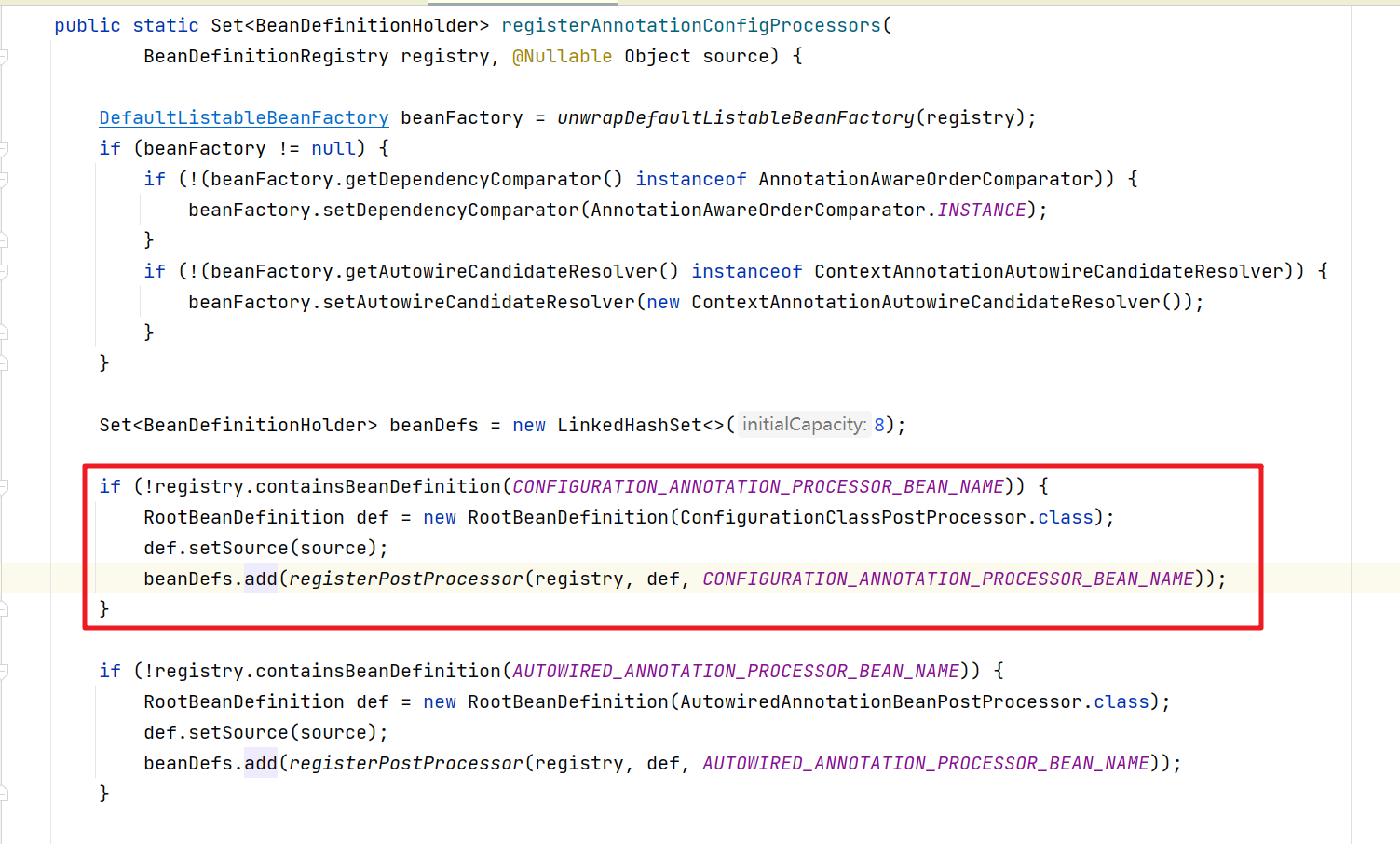
this.scanner其实就是创建了一个对应的扫描器

2.2 扫描实现
扫描就需要进入到scan方法中。


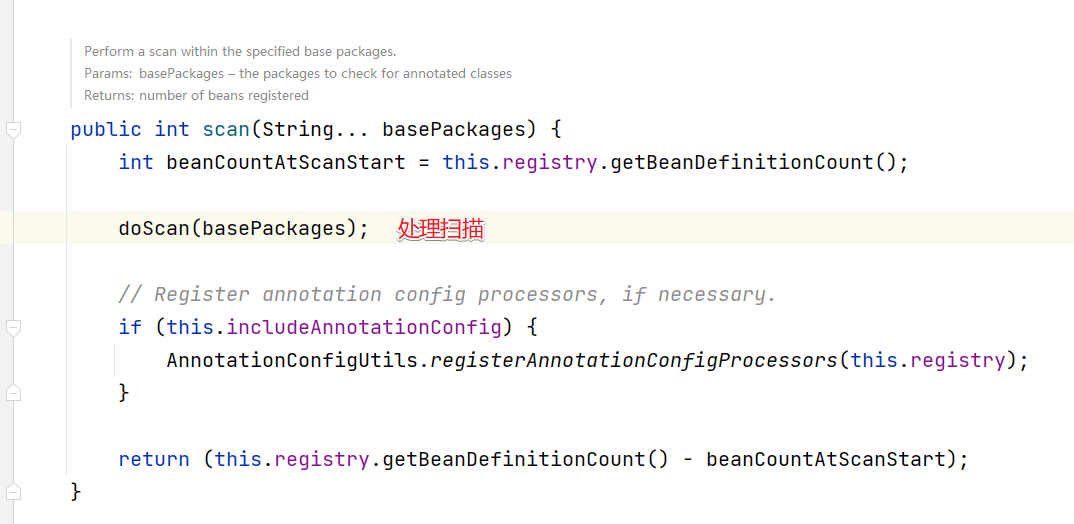
完成相关的注册
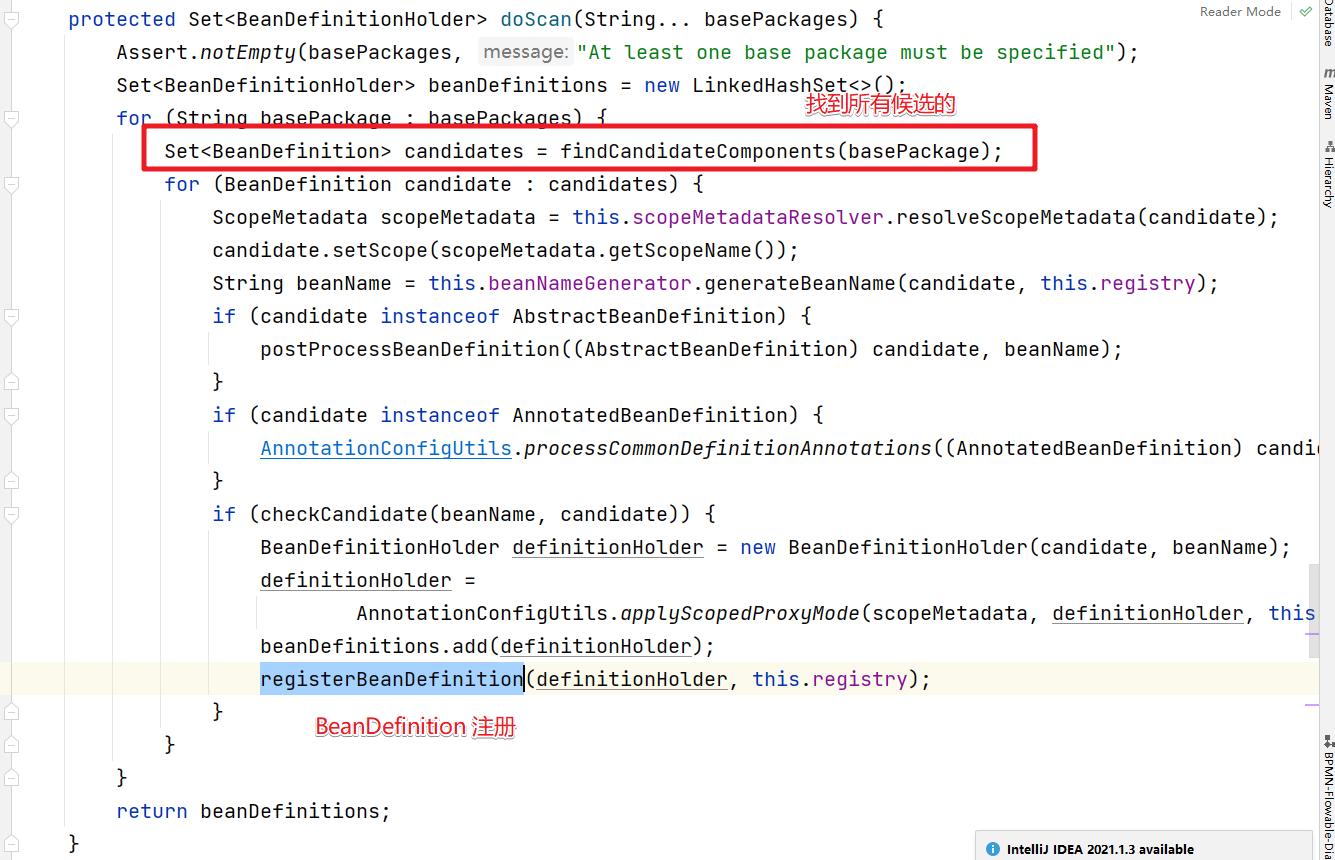
2.3 @Configuration
@Configuration的解析其实是在refresh方法中来实现的。
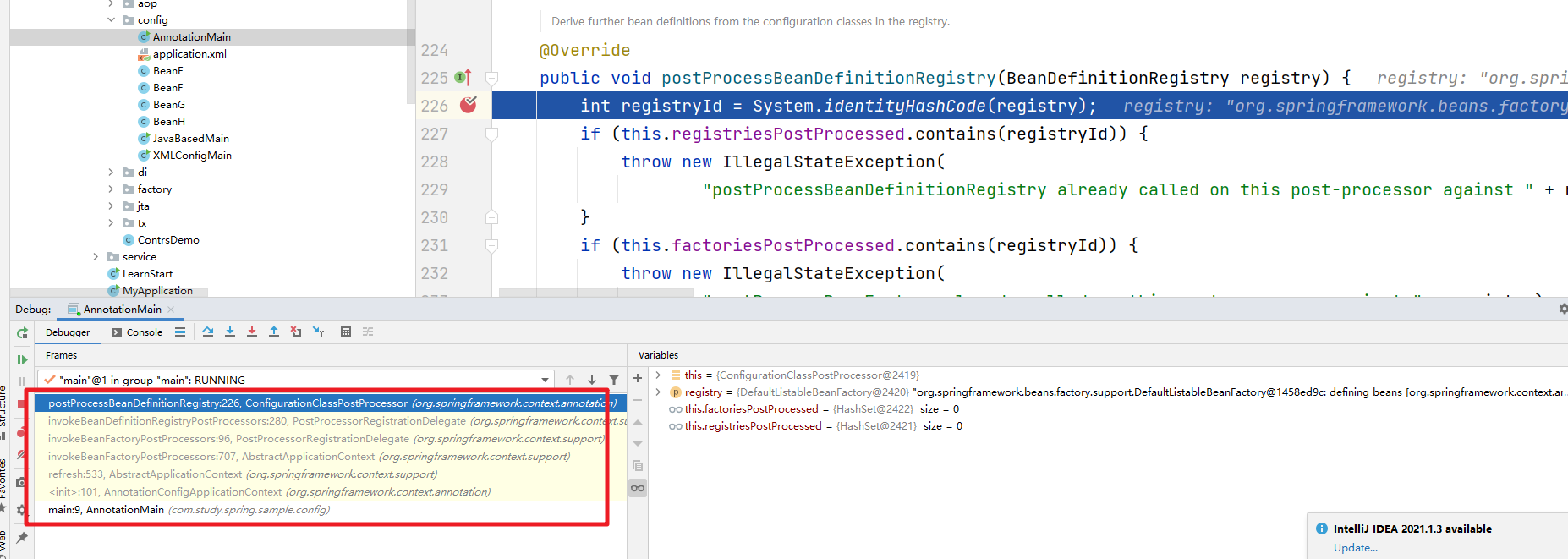
3.小结
通过上面的分析其实我们已经对Bean定义的扫描,解析和注册过程有了一定的了解。归纳为:
- reader解析XML,完成xml方法配置的bean定义
- scanner扫描指定包下的类,找出带有@Component注解的类,注册成Bean定义
- 通过ConfigurationClassPostProcessor对带有@Configuration注解的类进行处理,解析它上面的注解,以及类中带有@Bean 注解,加入这些的Bean的定义。
4.BeanDefinition
;然后我们来看看BeanDefinition的继承结构

继承属性访问器和元数据接口,增加了Bean定义操作,实现了数据和操作解耦。属性访问器和元数据接口接着往下看。
4.1 BeanMetadataElement
BeanMetadataElement提供了获取数据源的方式,也就是可以指导Bean是来自哪个类。
public interface BeanMetadataElement {
/**
* Return the configuration source {@code Object} for this metadata element
* (may be {@code null}).
*/
@Nullable
default Object getSource() {
return null;
}
}
- 1
- 2
- 3
- 4
- 5
- 6
- 7
- 8
- 9
- 10
- 11
- 12
4.2 BeanMetadataAttribute元数据属性
实现了元数据接口,增加了属性的名字和值。。
public class BeanMetadataAttribute implements BeanMetadataElement {
private final String name;
@Nullable
private final Object value;
@Nullable
private Object source;
}
- 1
- 2
- 3
- 4
- 5
- 6
- 7
- 8
- 9
- 10
- 11
- 12
4.3 AttributeAccessor属性访问器
AttributeAccessor用来给Bean定义了增删改查属性的功能
public interface AttributeAccessor {
/**
* Set the attribute defined by {@code name} to the supplied {@code value}.
* If {@code value} is {@code null}, the attribute is {@link #removeAttribute removed}.
* <p>In general, users should take care to prevent overlaps with other
* metadata attributes by using fully-qualified names, perhaps using
* class or package names as prefix.
* @param name the unique attribute key
* @param value the attribute value to be attached
*/
void setAttribute(String name, @Nullable Object value);
/**
* Get the value of the attribute identified by {@code name}.
* Return {@code null} if the attribute doesn't exist.
* @param name the unique attribute key
* @return the current value of the attribute, if any
*/
@Nullable
Object getAttribute(String name);
/**
* Remove the attribute identified by {@code name} and return its value.
* Return {@code null} if no attribute under {@code name} is found.
* @param name the unique attribute key
* @return the last value of the attribute, if any
*/
@Nullable
Object removeAttribute(String name);
/**
* Return {@code true} if the attribute identified by {@code name} exists.
* Otherwise return {@code false}.
* @param name the unique attribute key
*/
boolean hasAttribute(String name);
/**
* Return the names of all attributes.
*/
String[] attributeNames();
}
- 1
- 2
- 3
- 4
- 5
- 6
- 7
- 8
- 9
- 10
- 11
- 12
- 13
- 14
- 15
- 16
- 17
- 18
- 19
- 20
- 21
- 22
- 23
- 24
- 25
- 26
- 27
- 28
- 29
- 30
- 31
- 32
- 33
- 34
- 35
- 36
- 37
- 38
- 39
- 40
- 41
- 42
- 43
- 44
4.4 AttributeAccessorSupport属性访问抽象实现类
内部定义了1个map来存放属性。
public abstract class AttributeAccessorSupport implements AttributeAccessor, Serializable {
/** Map with String keys and Object values. */
private final Map<String, Object> attributes = new LinkedHashMap<>();
@Override
public void setAttribute(String name, @Nullable Object value) {
Assert.notNull(name, "Name must not be null");
if (value != null) {
this.attributes.put(name, value);
}
else {
removeAttribute(name);
}
}
// ......
}
- 1
- 2
- 3
- 4
- 5
- 6
- 7
- 8
- 9
- 10
- 11
- 12
- 13
- 14
- 15
- 16
- 17
- 18
4.5 BeanMetadataAttributeAccessor元数据属性访问器
继承AttributeAccessorSupport具备属性访问功能,实现BeanMetadataElement具备获取元数据功能。 **AbstractBeanDefinition就继承于它,使得同时具有属性访问和元数据访问的功能 **。
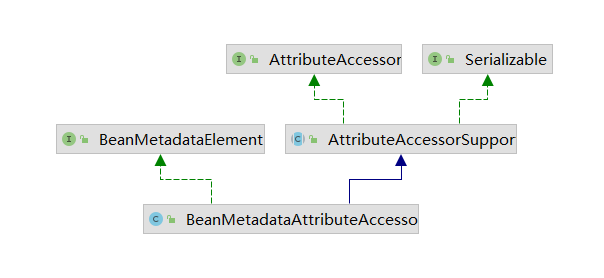
结合AbstractBeanDefinition.来看看他们的类图结构
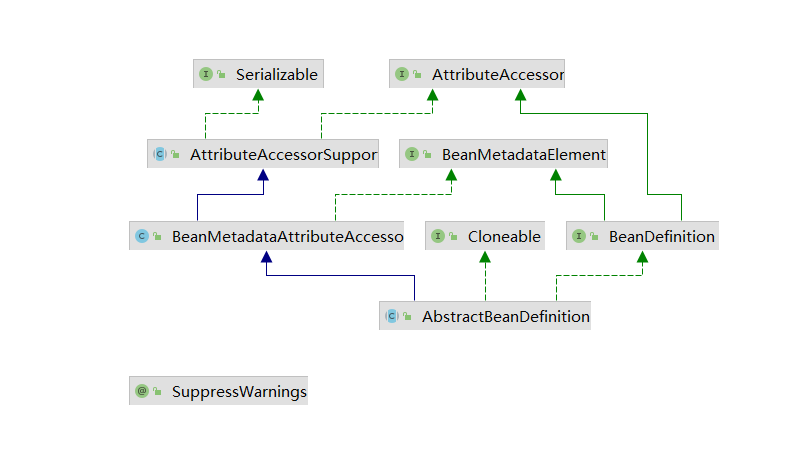
5. BeanDefinition继承体系
5.1 AnnotatedBeanDefinition
增加了2个方法,获取bean所在类的注解元数据和工厂方法元数据,这些数据在进行解析处理的时候需要用到。
public interface AnnotatedBeanDefinition extends BeanDefinition {
/**
* Obtain the annotation metadata (as well as basic class metadata)
* for this bean definition's bean class.
* @return the annotation metadata object (never {@code null})
*/
AnnotationMetadata getMetadata();
/**
* Obtain metadata for this bean definition's factory method, if any.
* @return the factory method metadata, or {@code null} if none
* @since 4.1.1
*/
@Nullable
MethodMetadata getFactoryMethodMetadata();
}
- 1
- 2
- 3
- 4
- 5
- 6
- 7
- 8
- 9
- 10
- 11
- 12
- 13
- 14
- 15
- 16
- 17
- 18
该注解有三个具体的实现。ScannedGenericBeanDefinition、AnnotatedGenericBeanDefinition、ConfigurationClassBeanDefinition。

5.2 AbstractBeanDefinition模板类
AbstractBeanDefinition我们可以称之为BeanDefinition的模板类。结构我们上面其实有梳理
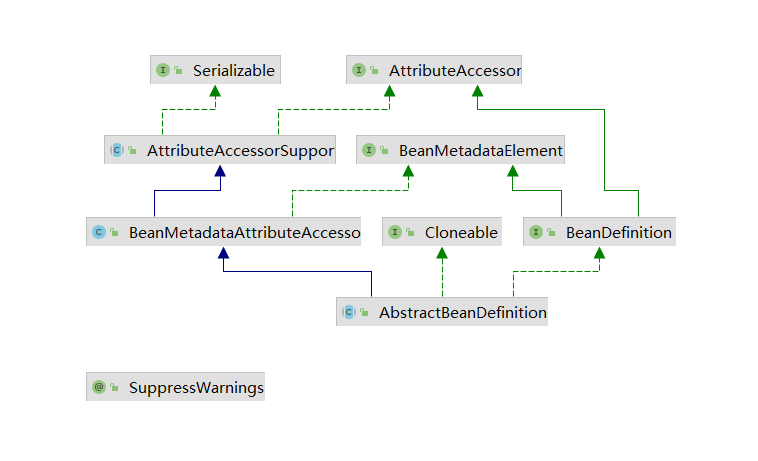
通过上面我们可以看到AbstractBeanDefinition 具备了 Bean元数据的获取和属性相关的操作。同时AbstractBeanDefinition的继承结构

5.3 RootBeanDefinition根bean定义
它主要用在spring内部的bean定义、把不同类型的bean定义合并成RootBeanDefinition(getMergedLocalBeanDefinition方法)。没有实现BeanDefinition接口的设置获取父bean定义方法,不支持设置父子beanDefinition。
5.4 ConfigurationClassBeanDefinition
用作ConfigurationClassPostProcessor解析过程中封装配置类的bean定义。
5.5 GenericBeanDefinition
GenericBeanDefinition通用Bean的定义。
5.6 ScannedGenericBeanDefinition
@ComponentScan扫描的bean定义使用。
5.7 AnnotatedGenericBeanDefinition
文章来源: dpb-bobokaoya-sm.blog.csdn.net,作者:波波烤鸭,版权归原作者所有,如需转载,请联系作者。
原文链接:dpb-bobokaoya-sm.blog.csdn.net/article/details/126963669
- 点赞
- 收藏
- 关注作者



评论(0)